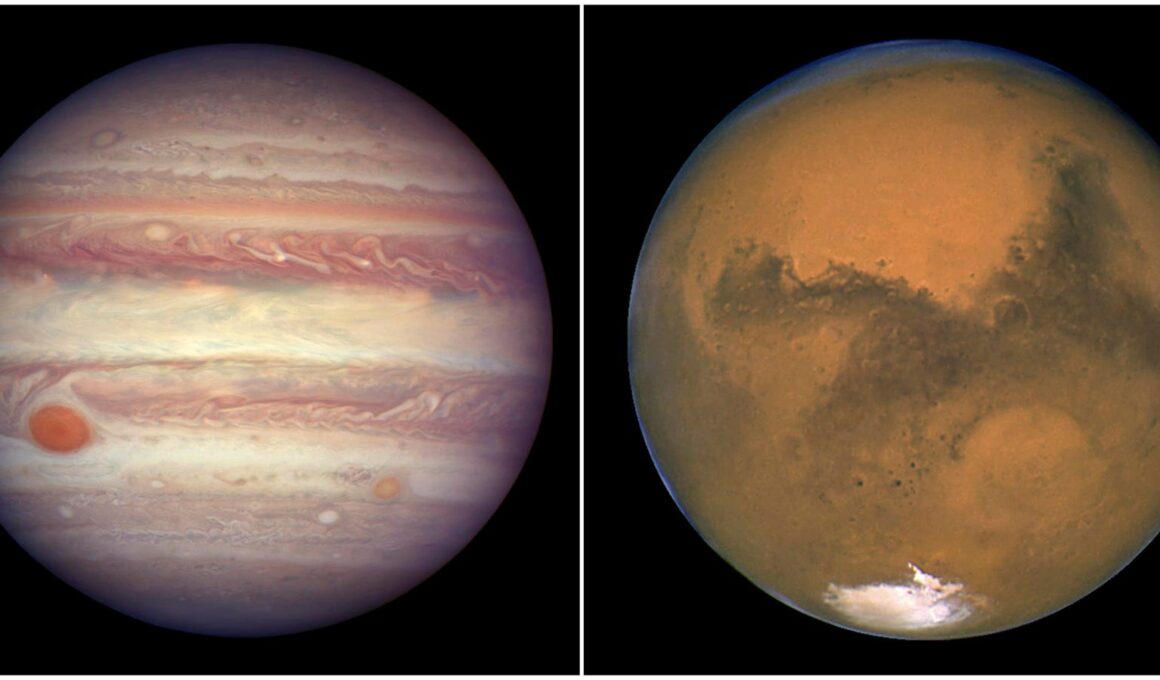Topline
Jupiter and Mars will be along the same line of sight just before sunrise Wednesday morning and are expected to be so close they’ll appear together—here’s what to know about the planetary conjunction.
This combination image, created from two photos provided by NASA, shows Jupiter pictured on April 3, … [+]
Key Facts
On Wednesday morning Mars will speed past Jupiter in “an extremely close pair-up,” or planetary conjunction, and will look to be just a third of a degree apart, or closer together than the width of a full moon, according to NASA.
Though the planets will appear alarmingly close for people viewing from earth, they will actually be more than 350 million miles apart, the Associated Press reported.
Jupiter, a gas planet, will likely appear much brighter than Mars, which is mostly made up of dust and rock, Space.com reported, though the closeness of the two is still expected to be “eye-catching.”
Get Forbes Breaking News Text Alerts: We’re launching text message alerts so you’ll always know the biggest stories shaping the day’s headlines. Text “Alerts” to (201) 335-0739 or sign up here.
How Can You See The Jupiter-Mars Planetary Conjunction?
NASA said the planets will be visible in the eastern sky a couple hours before sunrise. Telescopes and binoculars shouldn’t be necessary to see the conjunction, USA Today reported, though the two planets should be close enough to fit in the view of a single telescope.
Surprising Fact
Since 2000, Mars and Jupiter have been in conjunction 11 times, according to Space.com. The next time this specific planetary conjunction will happen is in 2026, and the planets will appear even closer together in 2033.
What To Watch For
Mars will quickly leave its proximity to Jupiter over the next nights, but on Aug. 27 the crescent moon will be close to both planets and will “form a captivating trio in the morning sky,” according to NASA.
Tangent
Some stargazers who don’t want to wait until Wednesday for a show may be able to see the northern lights and the Perseids—one of the most anticipated meteor showers of the year—on Monday night. Scientists predicted geomagnetic storm conditions may continue on into Tuesday and may cause the aurora borealis to be visible in some northern U.S. states. The Perseid meteor shower also peaked Sunday into Monday night, but is expected to be visible until it ends on Sept. 1.
Further Reading
Israel and Hamas. Previously, she has covered a range of topics from Donald Trump’s legal battles to Taylor Swift’s path to becoming a billionaire. She joined Forbes in April 2022 and is based in Colorado. Prior to joining Forbes, Bohannon covered local news and spent time at the Fort Collins Coloradoan and the Arizona Republic. She graduated with a degree in journalism from Creighton University and has an MA in investigative journalism from Arizona State. Follow Bohannon for continued coverage of pop culture, politics and updates on the war in Gaza.
“>







